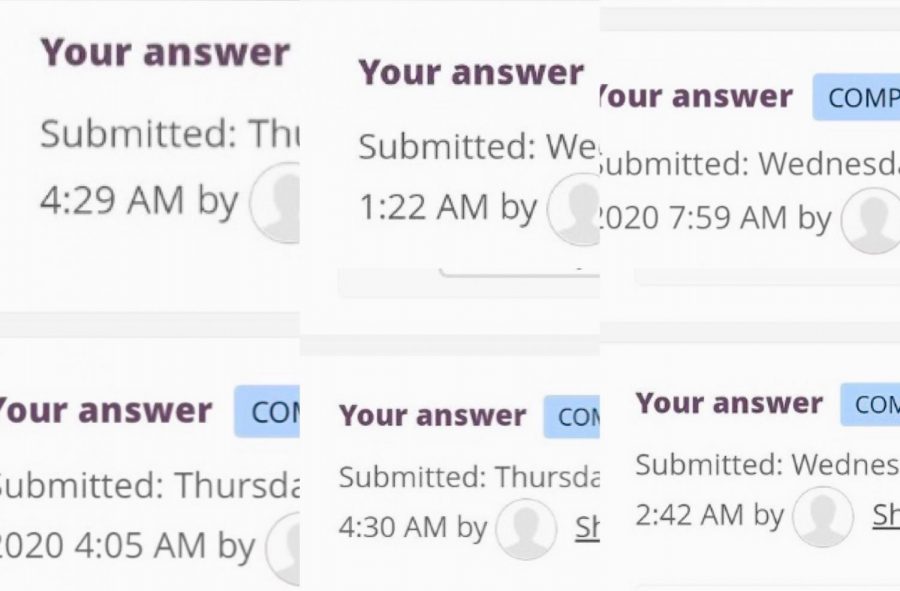Why do students procrastinate? Teachers confirm that 11:59 is the magic hour
Photo provided by Ella Goodweather
The timeline of students turning in assignments before class the next day.
You have definitely done it before. We all have. Your teachers did it. Your parents did it.
So, you turned in that assignment due at midnight at 11:59 pm. Do you think your teachers noticed that you and your friends do this? Well, they know. And we know too.
A right-before-the-deadline student myself, I interviewed my teachers and peers to find out why so many of us do it. I found that it happens in every subject and grade. As junior Eden Barr quotes one of her teachers saying, “ungodly hours of the night.”
So again, why did we do it? Procrastination, sleep schedules, work, clubs or extracurriculars. Maybe we work best at night, have home responsibilities or need time to relax from our busy schedule. Or maybe we prioritized other responsibilities or homework assignments and we do not always have the resources you need to complete your assignments. The fact is, at some point, we barely turned in that assignment before the deadline.
I recently asked four Bellaire students if they do this and they gave me a variety of answers. However, the consensus was that it is easier to start with the assignments they want to do and leave the other ones off.
Do our teachers notice?
While many teachers are aware of their students’ habits of the late-night-assignment turn-ins and all-nighters, they are more cognizant of whether a student turns in an assignment in the first place.
AP English Language and Composition teacher Jeffrey Waller said it does not stick out to him when an assignment is turned in late at night on the HUB unless it has passed the deadline.
However, teachers do notice when Remind messages are sent to them right before a deadline or in the middle of the night.
AP US History teacher Patricia Edaburn said about 30 percent of the time, she will receive a Remind message late at night on a Sunday.
Dr. Waller can relate. He also procrastinated in his high school days.
“Students get in a bad pattern where they come home and crash,” Waller said. “I suspect that virtual school has messed up students’ sleep patterns even more. I see assignments are submitted at all hours of the night.”
Edaburn senses that some of the students who turn in assignments late waited to the last minute, but at least they are getting their assignments in.
Edaburn, along with many Bellaire teachers, understands that this is not a typical year, and understands the difficulty many students have with time management. Students at home struggle with a lack of structure or other responsibilities in the home, due to the pandemic. And teachers like Edaburn will accept assignments, even if they have passed the deadline.
“Better late than never,” Edaburn said.
Has online school made students more likely to turn in their assignments late at night? Junior Crystal Tang and sophomore Anna Bronk said yes, as deadlines are now at midnight.
IB Astronomy and AP Physics C teacher James Newland said he used to make his assignments due at the end of the school day, but he learned that it is unreasonable for all his students to make this deadline, especially during virtual school.
Also, home situations due to the pandemic may also affect students’ habits. While some students are prone to procrastination, waiting until the last minute, others are busy taking care of younger siblings or with a job. Newland, Edaburn and Waller each agree that flexibility is important for their students’ success.
Each one of the teachers and students I interviewed agree that time management is key to success, yet so many students still struggle with it. Junior Sam Yifrach keeps an agenda and calendars his deadlines.
“I do my homework in the afternoon and then video games at night,” Yiffrach said. “I know a large group of students do it the opposite way, playing video games first then homework, but it is hard to gauge how much time you need for homework this way, and you will get too tired.”
Barr also sees this among her friends.
“Almost every single person I talk to has turned in something after the deadline,” Barr said. “Mostly, this is because of the time management struggle. During virtual school, it feels like I have more time than I actually do.”
Newland, Edaburn and Waller all notice time management being a struggle for their students.
“A lot of my students are spread too thin,” Waller said. “It’s hard to have self-discipline. The mentality is ‘oh, it’s not due until tomorrow, so I don’t need to do it right now’.”
Does procrastination work? Tang said, in some cases, it does.
“It can make you more productive,” Tang said. “Sometimes, I will work faster since I am working close to a deadline.”
In other cases, procrastination will not work. Barr said that procrastinating makes an assignment more stressful than it needs to be.
Is there a pattern in which students procrastinate? Yiffrach said that while he almost never procrastinates, it is more likely for him to procrastinate on the assignments that take the longest. Bronk also said that she will procrastinate on the assignments that are not as easy or fun as the other assignments. Tang also relates to both Yiffrach and Bronk’s view.
“A lot of procrastination is due to the sense of dread and not knowing how much time and energy it will require,” Tang said.
Will the procrastination end? Edaburn is hopeful that her students will finally put it to rest.
“When you have no other choice, you do it,” Edaburn said. “The motivation is there when you have to meet a deadline to get paid or not get fired.”
Tang hopes to stay on top of things in the future due to the higher stakes. Barr said she will also be less of a procrastinator in the future.
“Procrastinating is just part of life and growth,” Barr said. “It’s just human nature to sometimes do things at the last minute.”
Your donation will support the student journalists of Bellaire High School. Your contribution will allow us to purchase equipment and cover our annual website hosting costs.




Cynthia C. • Oct 24, 2022 at 11:23 pm
I agree; I work full-time, am single, have one income, three kids, no joint custody, practices every day for them, homework, dinner, and baths. etc. so I do my work at night. Some nights I am more tired and get less accomplished. In my literature classes, writing takes an enormous amount of time. Reading is daunting as my eye sight is poor, and even if it weren’t research and writing takes a long time. So, I have been working on one of my classes assignments for about six days now, it was due tonight at 11:59. I got stuck on a page break that kept doing what it wanted. So after I gave up and went to submit, it was seconds past 11:59 so the entire week 9 folder was gone. I didn’t even realize it counted in seconds. 11:59 is 11:59 to me. This is not a reflection of, oh your going to have to meet deadlines at work and so on get over it, your fault. This is reality; this is not a robotic world. And no job that I can get into is ever going to say; you’re fired; you’re seconds late. This discounts all of the work that was put in. Professors don’t see what goes on behind closed doors to get this work done, and lastly, I am the one paying for these classes. That is commitment right there; I am choosing to sacrifice my money to better my future (goal), which shows a lot more responsibility in the workforce than a few seconds of delayed turn-in on deadlines.
Carol Gaylord • Mar 14, 2022 at 4:38 pm
I agree with the teacher especially this year and last year due to covid 19 if the student is getting the work in is a good thing
That is like when kids shoe up a few minutes late to class I myself being a parent of 4 childrem my focus would not be on the minutes the student shows up late for class my focus would be on the student showing up to class. It’s the same thing as parents, teachers , role models need to focus on what the child, student, peers progress on their lives journey not their downfalls. Let us encourage one another to do better as an example not a dictator. Do as I say not as I do. Hypocrites are what they are called. The last thing a teacher, parent, etc. needs to be called is a hypocrite. We all need to be role models but most of all is we all need to be authentic
Real to each other. ??
Confess your faults one to another and thou shall be healed. Amen
Carol Gaylord • Mar 14, 2022 at 4:36 pm
I agree with the teacher especially this year and last year due to covid 19 if the student is getting the work in is a good thing
That is like when kids shoe up a few minutes late to class I myself being a parent of 4childrem my focus would not be on the minutes the student shows up late for class my focus would be on the student showing up to class. It’s the same thing as parents, teachers , role models need to focus on what the child, student, peers progress on their lives journey not their downfalls. Let us encourage one another to do better as an example not a dictator. Do as I say not as I do. Hypocrites are what they are called. The last thing a teacher, parent, etc. needs to be called is a hypocrite. We all need to be role models but most of all is we all need to be authentic
Real to each other. ??